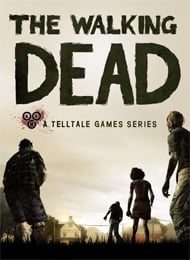What Kind Of Person Are You?
At this point, I would not hesitate to call The Walking Dead by Telltale Games one of the greatest works of gaming art in our current generation. The dark and grim themes of survival during a zombie apocalypse are expressed through story, characterization, setting, and, most importantly, mechanics. TWD forces you to make difficult decisions that may have no good answers. No matter how hard you try to play the game “perfectly,” people are going to die. People are going to hate you. The world is ending, and there is nothing you can do about. The joy of this game is watching how the world crumbles around you.
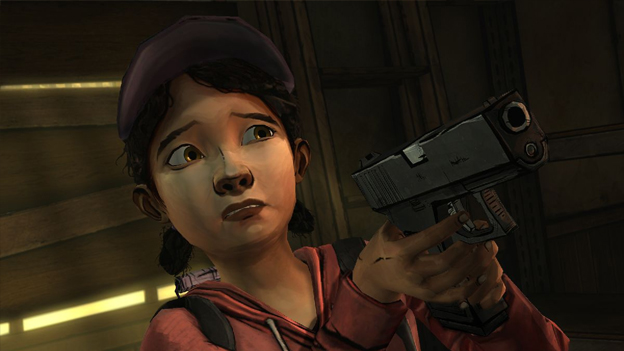
TWD episode 1 was all about shock and panic. The zombie apocalypse had just started and you were grappling with surviving in a strange new barren atmosphere. Episode 1 was the closest thing to a traditional point-and-click adventure game. It was about puzzles and problem solving, putting together whatever tools you could find in order to help your party survive. It was far less about social drama or decision-making and far more about simply getting by when there were zombies ready to eat your brains waiting around every corner.
Episode 2 flipped the zombie formula on its head in the way only The Walking Dead can. You see, it’s not the zombies that are most dangerous in a zombie apocalypse; it’s the people. Zombie apocalypses make people go crazy, and soon you get roving groups of bandits, people doing morally questionable acts, and a notable strain on supplies. You soon realize that you can’t make everyone happy, and Episode 2 was about hard decisions and choosing sides.
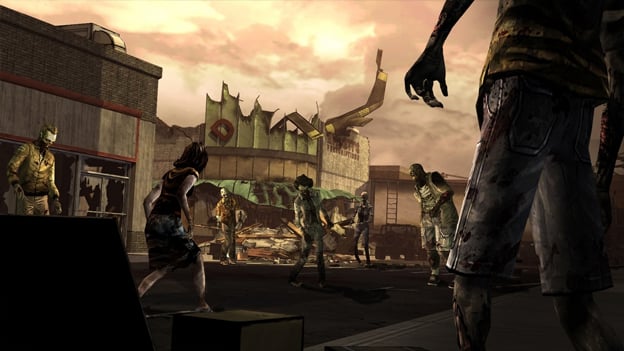
Episode 3 once again introduces a new theme to the game: trust. Right in the beginning, the possibility of a traitor is brought up. Someone may be betraying you and helping out the bandits that have been harassing you. Similarly, the characters that you met in Episodes 1 and 2 start to call your judgment into question. Some want to leave the encampment that you have stationed yourself in, while others want to stick with it to the very end. Members of your party are at each other’s throats. Your decisions begin to become the focus of the entire party’s actions. Soon you find yourself having to choose between what’s best for yourself and what’s best for others.
However, these choices aren’t nearly the same choices you faced in Episode 2. There are no debates here. There is no rational discussion. Episode 3 tasks your instinct more than anything else. It’s about following your gut on what is right and what is wrong. For better or for worse, Episode 3 is putting you through trials and tribulations, and the line between player and character starts to blur.
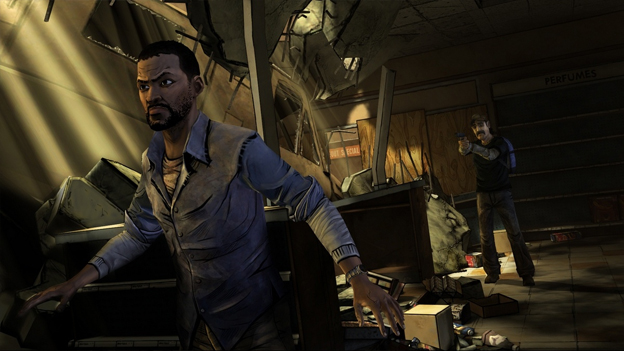
At this point, you have undoubtedly come to self-identify with Lee Everett, the main character of the series. You have built up relationships with the other characters in your party and you care about how they treat you. When Kenny, a character that has been around since Episode 1, starts to question your loyalty, it actually feels like a personal attack. It’s biting, gnawing at your moral subconscious, making you question the decisions you have made. Yet none of the characters is a paragon of good and justice. They are flawed just like everyone else. There is no “right” choice, but you’ll constantly wonder if you have made the “wrong” one.
I’ve rambled on about the enthralling metaplot enough, though, so let’s talk about the gameplay. Like the other episodes in the series, this is a point-and-click adventure. Episode 1 constantly bombarded you with puzzles, while Episode 2 prioritized dialogue over puzzle solving. Episode 3 uses both to great effect. The tense moments of the game are broken up by sequences of light puzzle solving, giving you a nice hill and valley effect. Your adrenaline will spike during the action sequences or the scenes with life-exploding personal drama, and you’ll be brought back down with a small puzzle or problem-solving task. None of these tasks are hard, per se, they just exist to calm you down and give you a little break from the action. Eventually, you reach a point where you feel safe—or, at the very least, moderately calm—when the action picks back up again and TWD throws horrible decisions and situations into your face.
It’s notable that Episode 3 feels a lot longer than the other episodes. I’m not entirely sure if this is because the episode actually is longer than most, or if it’s because the decisions I made felt like they had more weight. Unfortunately, there are points where it feels like the action moves just a bit too slowly, but once again, I think this is a matter of perspective. The episode itself feels so much more important that downtime segments just feel like they last much longer.
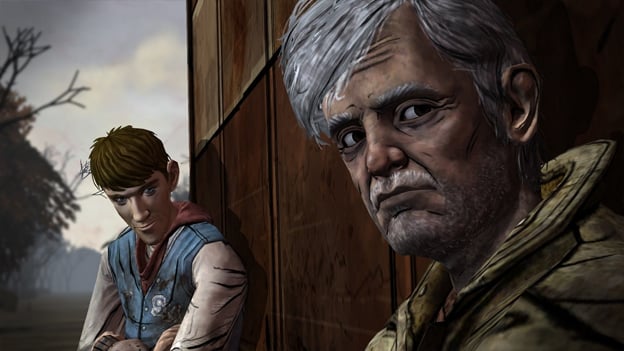
The game looks great, like always. The comic book graphical style leapfrogs right over the uncanny valley. It creates characters that we can project ourselves onto and identify with, even if they don’t necessarily appear to be “human.” However, as good as the engine is, it still had some issues. Certain lightning effects seemed off. Random animation errors made the game seem stiff at times. At one point, the camera even spazzed out on me. Still, all of this was fixed by a simple alt-tab out of the game window. It’s not nearly problematic enough to warrant a patch or a fix, it’s just something you’ll notice from time to time.
I honestly can’t say much more about The Walking Dead Episode 3 without spoiling it in ways that I’m not willing to do. This, dear readers, is art, pure and simple. This is what the video game medium allows us to do. This is cinematic gaming at its absolute best—a direct, personal, jarring, dark narrative. Savor it while you can, before the zombie apocalypse brings an end to all things.
RATING OUT OF 5 RATING DESCRIPTION 4.3 Graphics
Aside from a few errors, the graphics look great as always. 4.0 Control
It’s a point-and-click adventure, and that’s hard to screw up. 4.8 Music / Sound FX / Voice Acting
The voice acting is perfect. 5.0 Play Value
This is art, pure and simple. 4.8 Overall Rating – Must Buy
Not an average. See Rating legend below for a final score breakdown.
| Review Rating Legend | |||
|---|---|---|---|
| 0.1 – 1.9 = Avoid | 2.5 – 2.9 = Average | 3.5 – 3.9 = Good | 4.5 – 4.9 = Must Buy |
| 2.0 – 2.4 = Poor | 3.0 – 3.4 = Fair | 4.0 – 4.4 = Great | 5.0 = The Best |
Game Features:
